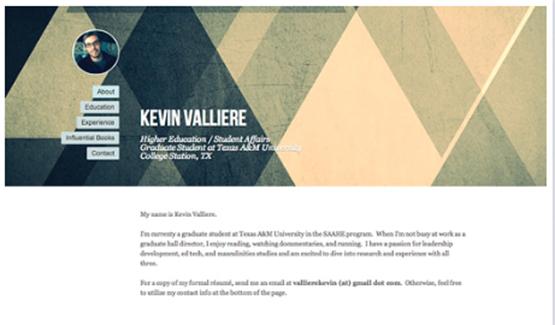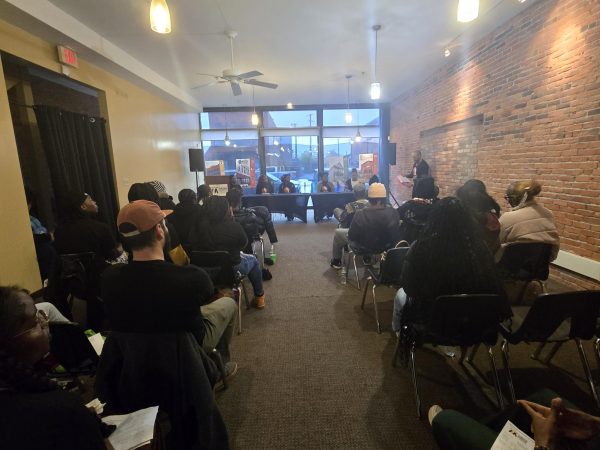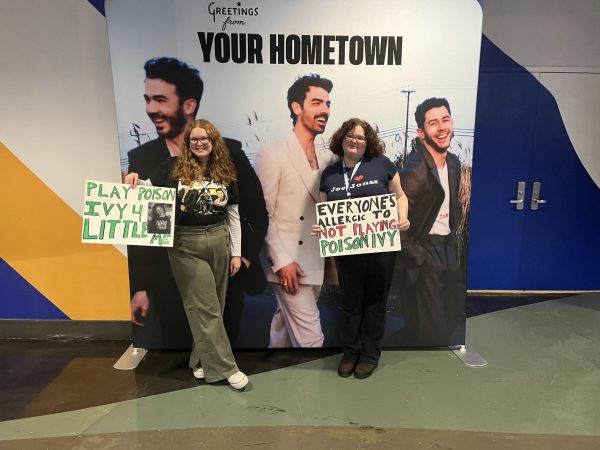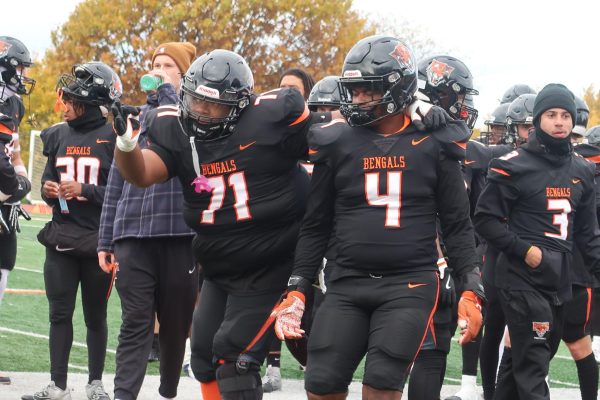Personal career Web sites: hit or miss?

Graphic from Strikingly website
A sample template for a personal website done by Strikingly.com. Various sample templates are available on the full website.
Job seekers are now more frequently creating personal websites as a type of online resume.
Senior college students in particular may find a personal website suitable as they prepare to begin job seeking.
David Chen, a Chinese-born University of Chicago graduate, is CEO of Strikingly.com, a website builder that allows anyone to build a simple website with mobile devices in mind.
Chen said that in a Forbes article he read, over half of prospective employers saw websites as the strongest branding tool for any job seeker. Chen added that just like having a website for a business adds a statement of legitimacy, having a personal website in addition to a LinkedIn, Facebook or Twitter page, shows that you are serious about who you are and the job you are trying to seek and helps you stand out from the bunch.
“Websites are a strong branding tool. They are a must-have for people who care about their branding,” Chen said. “It’s your own image, your own space and your own identity.”
Chen said that the value of a website for job seeking purposes is that you do not have to constantly update it as you would a blog; that a website is meant to be a more stable information portal.
“Your storyline won’t change that much on a day-to-day basis and your website can tell that storyline,” Chen said.
Chen believes that a website is the one thing that all social media sites that allow you to have an online image still ask for when users create an account. He said that when creating a Twitter, Facebook or LinkedIn account, there is still a place to link your website, so users are using these social media sites to potentially get traffic into their personal websites.
Chen added that one benefit of a website is that users are able to arrange content as they please, where in other portals you are forced to follow a specific structure and put down only the information that they have space for.
The name Strikingly projects Chen’s motto that people who create a website using his portal will have a striking experience. With that in mind, users are now able to create a website in seconds with a new one-step option that allows users to connect to LinkedIn and that way Strikingly automatically puts all their LinkedIn information into a website that users can the customize.
While Chen is an advocate for everyone creating website as a branding tool that employers can Google search, Jessie Lombardo, assistant director at the Career Development Center, said that she sees a website as a way to enhance and demonstrate skills individuals have versus actually creating a website solely for job seeking purposes.
“I’d rather see a student invest time in a really good cover letter, a really good resume, a really good mock interview so that their skills are really refined versus creating a fancy website,” Lombardo said. “Because at the end of the day if you’re not going to be doing website design [employers] are not are not going to really care about that skill set necessarily. They want to know, ‘do you have the skills to do the work we want you to do?’”
Lombardo said the decision of creating a personal website should be based on the field that students are going into. She said that creating a website might be more beneficial for a student going into a technical field or a computer science field in order to prove that they have the experience and the skill set to do it.
Lombardo clarified that all employers are different and prefer different things, so a website might impress some and not others. She said in reality, employers are really busy and the thought that they would actually go on your website might not always be possible for them.
As a mediator between students and employers, Lombardo finds that employers are using LinkedIn as a way of pre-evaluating prospective employees.
“Employers are using it to sort candidates. It’s a little bit easier to go online where you can search for candidates with a key word,” Lombardo said.
Lombardo explained that a LinkedIn page is essentially a resume online. It does not serve as a website per se, but it functions as one.
“What I really like about it, especially for job seekers, is that the very beginning of your profile, your summary, is essentially a philosophy of what it is you are searching for, so it allows the job seeker to say what it is they want and the skills they possess for that particular job,” Lombardo said.
The CDC offers workshops to help students and alumni learn the ins and outs of creating a professional LinkedIn profile. The workshop schedule can be found by clicking on the “workshop” link on the CDC website at http://bsccdc01.buffalostate.edu/cdc/cdc_home.php.
Kade Henderson, a senior fashion merchandise management major from Rochester at the Fashion Institute of Technology, has had a personal website since 2009. She defines her website, KadesMode.com as a fashion and lifestyle website for style-conscious individual.
Henderson, a wardrobe stylist and writer, said that ninety percent of her job opportunities were gained due to her online presence.
“With this in mind, you are only as good as your last post, tweet or update. Therefore I believe that having a website or online resume is not only beneficial for computer technology careers but anyone who is actively seeking a placement in today’s job entertainment force,” Henderson said.
Henderson is a fanatic of online branding and besides her website, she also constantly updates her accounts with every known social media outlet.
She believes that people are googling and researching more often, so having a website or resume coming on the search feed “not only looks impressive, but it provides to a positive representation of how serious you take yourself and your work field.”
Email: vega.record@live.com







Smithg138 • Mar 31, 2014 at 11:20 am
Very nice! edffbeegdb